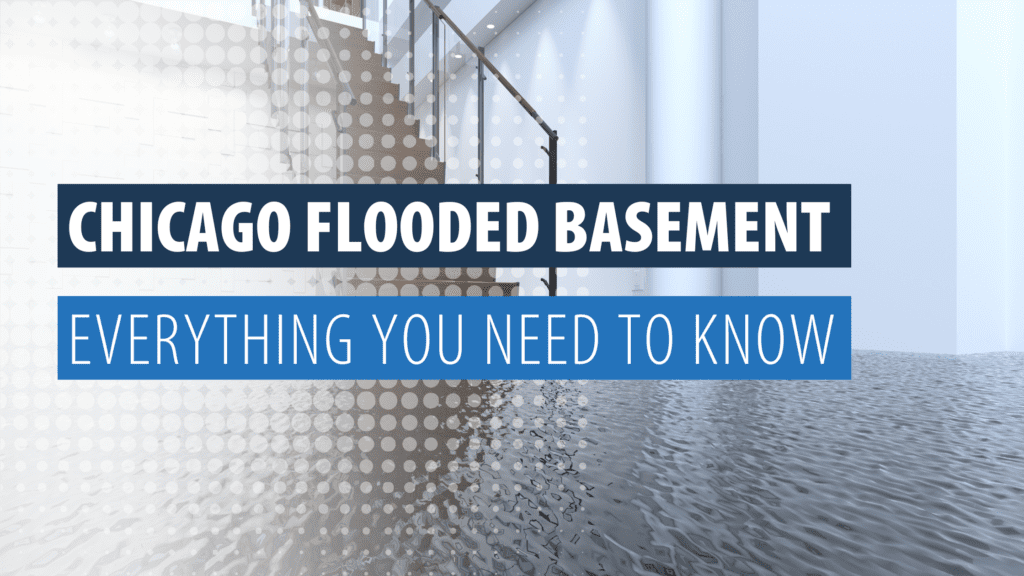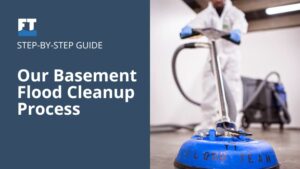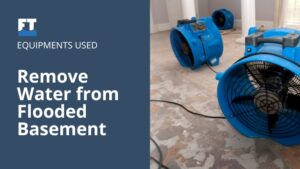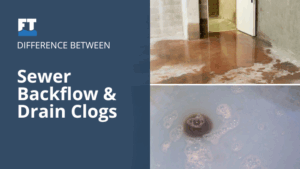You’ve likely read similar headlines:
“Glenview public works crews respond to over 30 flood instances after 6.4 inches of rainfall.”
“Reports of basement floods in Clarendon Hills following 2 inches of rain in one hour.”
“Record rains flood basements in…”
Name the Chicagoland city, and it’s likely experienced one thing:
FLOODING.
Unfortunately, headlines like these aren’t likely to be a thing of the past. With intense, unpredictable Chicago rainfall in recent years, “Nobody can guarantee you will never flood.” Those are sobering words from Chicago’s Department of Water Management, which explains why Chicago city basements often fall prey to water damage.
A Deeper Look at Why
We know Chicagoland basement floods have become a more regular occurrence, but why exactly? Over the past several years, torrential rains have poured inches upon inches onto neighborhoods in record time. With as much as 500 gallons draining off rooftops in an hour, rainwater quickly fills sewer mains, causing the untreated excess water to back up into your basement’s private drains.
The result?
Devastating basement floods resulting in quite a water mess and a major source of stress: Soaked belongings, soggy flooring, ruined furniture, weakened foundation, damaged building materials, and even the potential for rapid mold growth would send anyone reeling in tearful overwhelm. That is the case for too many Chicago residents experiencing a basement flood.
Basement Flood Dangers
To make matters worse, flooding is dangerous. Extracting water, drying, cleaning, and sanitizing following a basement flood is not a DIY project but one for trained professionals. Why? Well, for one, there are serious dangers to consider. Here are a few that should make you weary of attempting the drying and clean-up process alone. Instead, immediately call a water remediation specialist like The Flood Team to clean up your Chicago basement flood:
Electrocution – Basements are hardwired to store your home’s electrical system. To turn off your home’s electricity, at times you must do so at the basement level. This can be very hazardous, especially when wading through basement flood waters. A water remediation specialist is trained and equipped to deal with such dangerous situations, arriving with personal protective gear that protects them against electrical shock and contamination.
Water Contamination – Speaking of contamination, it is safe to assume that floodwaters contain sewage, bacteria, and other disease-carrying agents that can result in serious illness. Special measures are required to ensure contamination doesn’t spread to people and unaffected areas, posing a more widespread health issue to you and your loved ones.
Foundation Issues – Water can pack a big punch where your home’s foundation is concerned. Damage can create tiny cracks in the foundation’s concrete, thus weakening it and potentially causing instability in your home. Water remediation specialists are trained and equipped to mitigate damage to your foundation quickly. Additionally, water is sneaky and sticky! It sneaks under baseboards, walls, and into areas easily overlooked. The adhesive nature of water causes it to pull or absorb upward. This capillary action can weaken the structural strength of floors, framing, and drywall.
Rapid Mold Growth – Time is of the essence when water damage is involved. Under moist and humid conditions, microscopic mold spores, present virtually everywhere, can grow and thrive, creating secondary damage to your basement and severe hazards to health.
All these dangers and more should encourage you to immediately contact professional water remediation specialists to restore your home’s health after a basement flood. The Flood Team is available to receive your call 24/7. Expect a professional to be on location in record time to get the job done safely and efficiently. Time is ticking, so call today!
Why Trust the Chicago Flood Team?
For over 30 years, The Flood Team has specialized in drying, clearing, and restoring properties after basement floods. By immediately contacting a reputable water remediation specialist like The Flood Team, you can reduce the damage to your home’s foundation and belongings. Our skilled and compassionate team will serve and lead you every step of the way from a quick response time, free evaluation, rapid drying, and clean-up services, and we contact your insurance so you won’t have to.
Our trained insurance specialist can serve as your insurance ally to ensure you receive the money due to cover clean-up and restoration costs. The Flood Team houses all pictures, videos, and documents on our proprietary Flood Team app to share with you and distribute to your insurance seamlessly.
The Flood Team is equipped and trained to do the heavy lifting, so you can take a load off as we restore your basement and peace of mind.
Ways to Prevent a Chicago Basement Flood
With unpredictable, record-setting rains, you’re likely wondering how to prevent a basement flood in your Chicago home in the first place. Chicago city officials detail several ways you and your neighbors can avoid a flooded basement and its painful aftermath. Heeding their advice may mean the difference between retreating to your basement to experience a relaxing night or climbing down stairways to a distressing, soggy sight.
The primary prevention (1) aims to accomplish one thing: Divert as much water away from the sewers as possible during the next heavy downpours:
- Disconnect downspout from sewer system. One of the first things you can do to avoid a flooded basement in Chicago is to manage heavy rainwater by disconnecting your downspout from the sewer system to redirect stormwater elsewhere on your property. This should be a permanent preventative measure, so determine if this is feasible for your home and will not result in flooding on your property. The goal is to slow down the rate at which stormwater leaves your property. Instead of a downspout directing water to a neighborhood sewage system where it can then overflow and back up into your basement, it can be redirected to an area on your property that could use the water or even collect in a water barrel for later use. Landscaping with deep roots, such as trees or rain gardens, can absorb excess water more efficiently than a typical lawn, so directing stormwater to these locations is preferred.
Additional preventative measures include:
- Professional landscaping. Consider having a professional rework your property’s landscape grade so rainwater does not pool around your home’s foundation, finding its way into cracks and holes.
- Routinely test sump pump. Sump pumps can become a major cause of flooded basements as well. Though rainwater is a chief cause of basement floods in the Chicago area, testing sump pumps that can malfunction over time can help prevent this from becoming an issue.
- Regularly inspect home foundation. Over time, as a home settles, basement walls may develop cracks. Repairing these is imperative, especially in areas where heavy rains can create rapid flooding, resulting in water seeping through cracks and weakening the foundation.
- Clear foundation drains, and floor drains. To avoid sewage backups, ensure that all drains are free from clogs. Address immediately if the drains become sluggish, which could lead to a more extensive future blockage.
Though heavy Chicago rains are likely here to stay, there are certainly ways you can keep rainwaters at bay, especially where your basement is concerned. Should a basement flood occur despite your best efforts or before you can take preventative action, know that The Flood Team is on hand 24/7 to address your flood damage with speed, compassion, and expertise. Let us put our 30-plus years of service to work for you. We know water and the damage it can cause, so The Flood Team is your best bet when things get wet. We will restore your home and aim to reduce any loss and cost to you.
“Chicago homeowner breathe sigh of relief after flooded basement is restored”
How’s that for a <u>Chicago Tribune</u> headline? Call The Flood Team today so we can be on our way!









